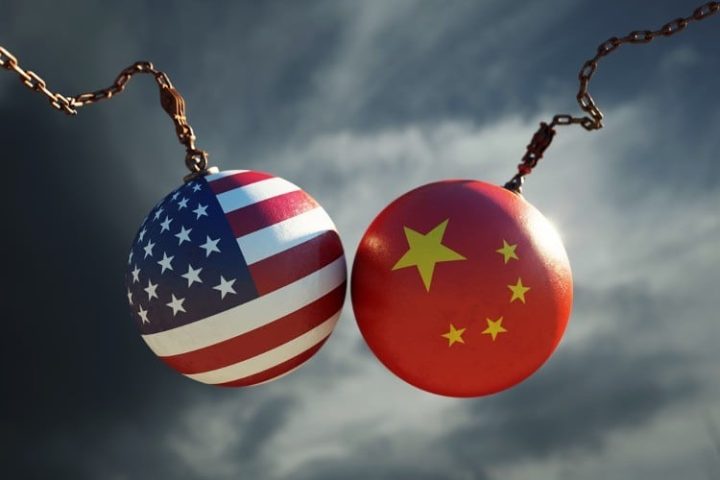
SINGAPORE — Biden’s “weak leadership” and American actions of “poking the panda” could catalyze a U.S.-China conflict, Singapore’s former foreign minister, George Yeo, revealed in an interview ahead of the launch of the first of his three-part book series, Musings.
Yeo elaborated that American actions and decision making appeared convoluted due to Biden’s “weak” presidency. He said, “If there is a strong US presidency, I don’t think we would be in danger, but because he is weak and many people are playing different games, we wouldn’t really know.”
Classifying U.S.-China tensions over Taiwan as “dangerous” and “troubling,” Yeo said Washington was “poking the panda” over an issue “so sensitive, it’d react neurologically.”
Constant American provocation would result in “a bomb which will explode in our faces,” claimed Yeo, who is currently a visiting scholar at the Lee Kuan Yew School of Public Policy at the National University of Singapore.
U.S.-China tensions have taken a turn for the worse, especially following U.S. House Speaker Nancy Pelosi’s Taiwan visit in early August. In response to Pelosi’s visit, the Chinese military ramped up drills near Taiwan.
Another high-level U.S. congressional delegation, including Democratic Senator Ed Markey, traveled to Taipei less than two weeks after Pelosi’s visit.
To add fuel to the fire, U.S. Senator Marsha Blackburn (R-Tenn.), who is on the Senate Commerce and Armed Services committees, arrived in Taiwan on August 25 — the third visit by a U.S. dignitary this month, despite Chinese pressure to stop the trips.
To do some damage control, the White House has highlighted that the U.S. Congress is an independent branch of government and that Washington’s one-China policy remains intact.
Yeo commented that the U.S.-China meeting at the upcoming November G20 summit in Indonesia would compel Washington to synchronize the policy positions of different government departments. Nonetheless, Yeo added, “China wants to lower the temperature, while the key concern of the US is the midterm elections.”
“There are people in the US who wouldn’t be averse to baiting China to make a wrong move, and then [Washington] will hit back and give China a bloody nose, or think they can,” Yeo remarked. “People will believe that war with China is inevitable and if it’s inevitable, the earlier you have the encounter the better, because with each year, China gets stronger.”
Yeo’s comments were reinforced by other incumbent Singaporean politicians, including Singapore’s prime minister-in-waiting Lawrence Wong, an alumnus of the University of Wisconsin-Madison, the University of Michigan, and Harvard University. Earlier this month, Wong cautioned that the United States and China could “sleepwalk into conflict” if they failed to address escalating hostilities over Taiwan. Wong added the relationship between the world’s largest economies was on a “very worrying” trajectory following Pelosi’s visit to Taiwan.
Moreover, during Singapore’s recent National Day Rally Speech, which is akin to the American State of the Union address, incumbent Prime Minister Lee Hsien Loong expressed his concern over deteriorating U.S.-China relations over various issues, including the recent hostilities over Taiwan. The frosty U.S.-China relationship has made cooperation on global issues such as nuclear proliferation “almost impossible,” Lee remarked. “This is bad news for the world,” he said.
Lee warned that more geopolitical conflicts in the Asia-Pacific region could be expected, alluding to the ongoing Ukraine-Russia conflict that had further worsened U.S.-China ties and impacted regional security.
Furthermore, when interviewed about U.S.-China ties by The Straits Times, Singapore’s national newspaper, incumbent Singaporean Foreign Affairs Minister Vivian Balakrishnan indicated the increasing risk of a political mishap or miscalculation between the United States and China.
“I do not believe any one of them are actually setting out to wage war on each other, but I do worry there is a very real risk,” Balakrishnan said. “Each party unilaterally deciding what its national interests are and what its response or counter response to the other party will be may inadvertently set itself up for an escalatory spiral.”
Also, Balakrishnan alluded to the events that happened just prior to the First World War when describing his views on the deteriorating ties between the United States and China at present. The minister said that while the major powers back then did not intend for war to break out, a “series of steps, incidents, mishaps and this locked-in spiral led to a terrible situation.”
“That’s why I remain so concerned about the prospects of global peace,” Balakrishnan warned. “The world has entered a very dangerous phase.”
The city-state of Singapore has been active on the global stage in encouraging the United States and China to eschew a clash that could quickly intensify and impact smaller countries in the Asia-Pacific region. Notably, while Singapore regards China as its top trading partner, it also advocates for a robust U.S. presence in Asia by permitting American troops to access its military facilities.
This balancing act played by the city-state is reflected in Yeo’s comments that, though the worsening of U.S.-China ties is leaving Singapore “caught between a rock and a hard place,” it is not Singapore’s role to help counter Beijing.
“That is not our game. It’s the US game; it’s Japan’s game, but we’re not part of this.”



